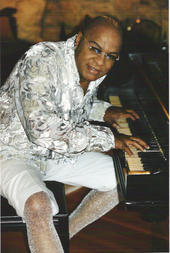with "El Tun Tun de tu Corazon"
can be purchase / se puede comprar en: ..
Click Here / Entra aqui
La Palabra was born and raised in the small coastal town of Caimanera , Oriente , Cuba . He broke into the New York City music scene as a 15-yr old when he joined the sextet Lalo y La New Yorkina and alternating with acts Richie Ray, Eddie Palmieri and Joe Cuba. He recorded for the first time playing piano on Lalo y La New Yorkina's single "Rompe Tu Pared," with Hector Casanova on vocals.
Palabra founded his high school's first integrated band, "The Blazers" who beat The Sons of Soul out of first place at the 1969 Detroit State Fair with its compelling performance of "Son of Ice Bag." As a high school student, he wrote "Amor de Juventud," later recorded by Ricardo Lemvo in the 1980's. As a college student in Detroit , La Palabra introduced a new genre of Latin music to the city called "Salsa Rock/Salsa Soul," a mixture of Cuban guaguanco, salsa, and American rock and roll. That same year he recorded the album "Earthquake" on the Strata Records label, an affiliate label of John Sinclair (a personal friend of John Lennon of The Beatles) which contained a combination of salsa rock and ballads. Strata Records closed its doors due to insufficient financial backing so the album was never released.Palabra played the Detroit circuits with Stanley Mitchell and the People's Choice, Brainstorm, the Five Specials and Norma Belle and the All Stars and sharing the circuit with Earl Klu, Chapter 7 (with lead singer Anita Baker) Dennis Koffe and Lyman Woodard and the Organization. Then in 1977, he went on tour with Brainstorm (who later appeared on Soul Train) and the Five Specials. The tour included Kool and the Gang, the Average White Band and Fat Back Band, etc. After he joined Norma Belle's band, Stevie Wonder invited him out to Los Angeles to join his band, Phoenix Rising.
While in Los Angeles , Palabra began experimenting mixing Cuban rhythms with American pop music and created a new style of salsa that combined salsa with romantic lyrics. La Palabra named it "Ballada en Salsa." Industry executives later coined it "Salsa Romantica."
In 1979 Palabra partnered with Jesus "El Nino" Alejandro to form Orquesta Versalles. Palabra and "El Nino" performed together packing such popular Los Angeles nightclubs Club Candilejas and Club Riviera , as well as the Marina Hotel in Las Vegas . Together they released a 45" under Orquesta Versalles (a.k.a. Orquesta Candilejas) which featured El Nino's arrangement of "Me Voy Pa' Puerto Rico " on side A and Palabra's arrangement of "Todo Se Derrumbo" on Side B. "Todo Se Derrumbo" became the hit.
Towards the end of 1981, Palabra was approached by Joni Figueras who proposed to Palabra that she and Palabra produce a CD together and introduce ballada en salsa (salsa romantica) to the commercial market. Palabra remained committed to Wonder. Several months later Louis Ramirez and Ray de la Paz came to the West coast and under the guidance of Figueras (by then a representative of K-Tel Records), released the CD "Noche Caliente" for which Ramirez and de la Paz were given the token names "the pioneers of salsa romantica" and which gave rise to the trend of salsa romantica in the commercial music industry.
In 1982 Wonder's team abandoned the Phoenix Rising project. Palabra and Versalles released a self-titled album on Profono Records (then a division of CBS Records) that contained Palabra's rendition of the song, "Lady." "Lady" became an overnight success blowing the lid off of charts from coast to coast and maintaining first place in the underground circuit within the United States and abroad for several years.
In 1984 Palabra took Versalles to Miami . However, never fully aware of the impact "Lady" was making on Latin music around the rest of the world and believing Profono Records failed to meet their expectations as a record label, he left Profono Records in 1984. He began using the artistic name, "La Palabra," and formed a new group called Sensation 85. He released a self-titled LP that featured Nestor Torres on flute and gave Luis Enrique (then a bongo player from Nicaragua ) the opportunity to transition from bongo player to singer for the first time.
La Palabra kept
Miami
dancing with Sensation 85 when in 1986, Luis Enrique accepted a sign-on deal
with CBS Records (then Sony Records) and left the band. Shortly thereafter,
Lefty Perez joined the band as the singer from Alex Leon y Los
Leones
de la Salsa. Perez sang with Palabra until he accepted a sign-on deal with T
& H Records in 1988. By this time Palabra was the only artist left standing
without a record deal. Devastated, he
decided to leave the music industry and for the next five years salsa became
nothing but a sauce.
In late 1999, Palabra moved back to
Los Angeles and with the help of Chuck
Neustein began recording the project "Rap-A-Salsa." Halfway through the recording, Palabra met
Mel Morow of Morrowland Records. In
2000, Morrowland Records released the CD "On Fire" which featured
Palabra's versions of "Todo Se Derrumbo" and "Lady." "Lady"
became a hit all over again, being played throughout the
United States and abroad including Europe, Asia,
Israel and
Latin
America - putting Palabra back on the map.
